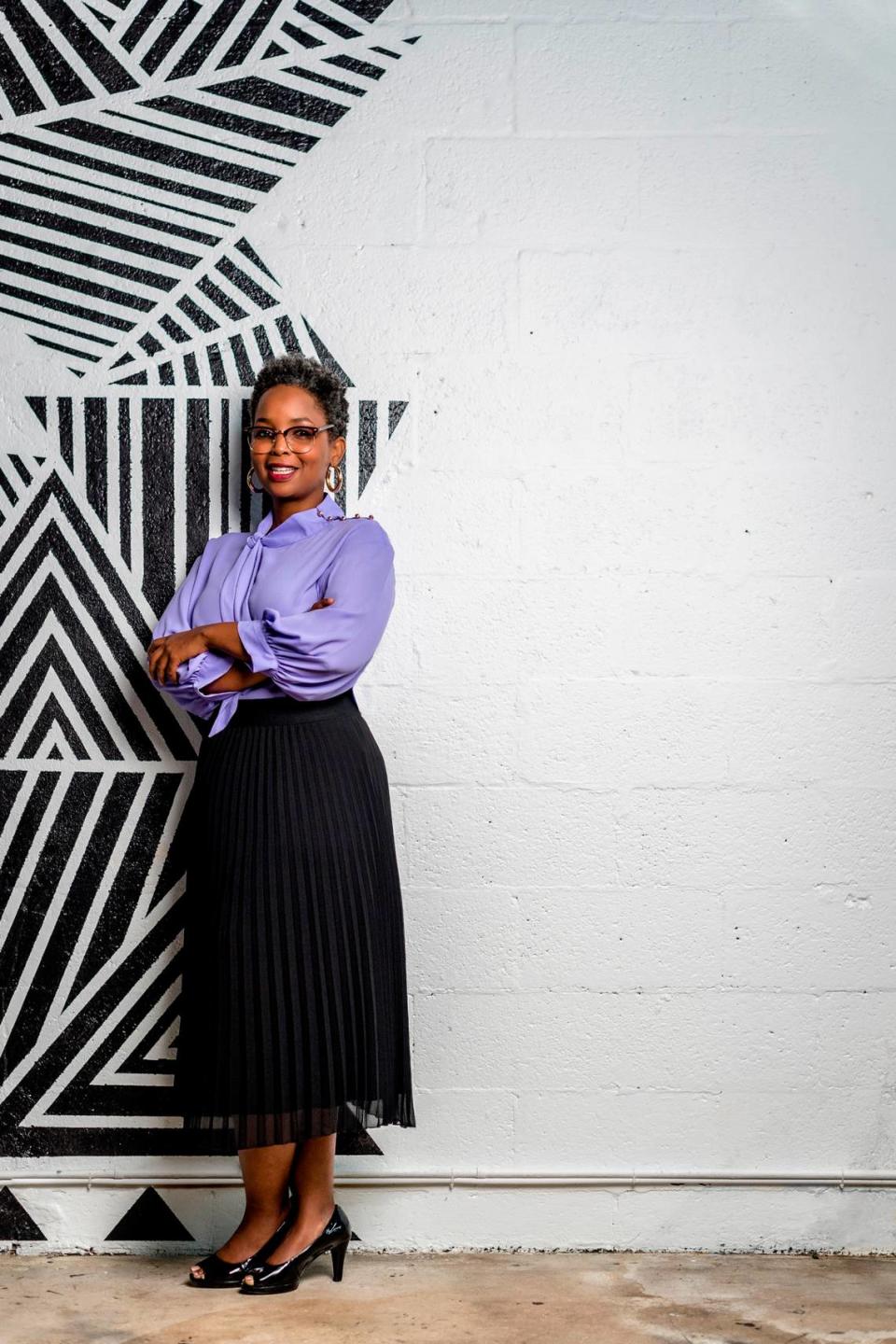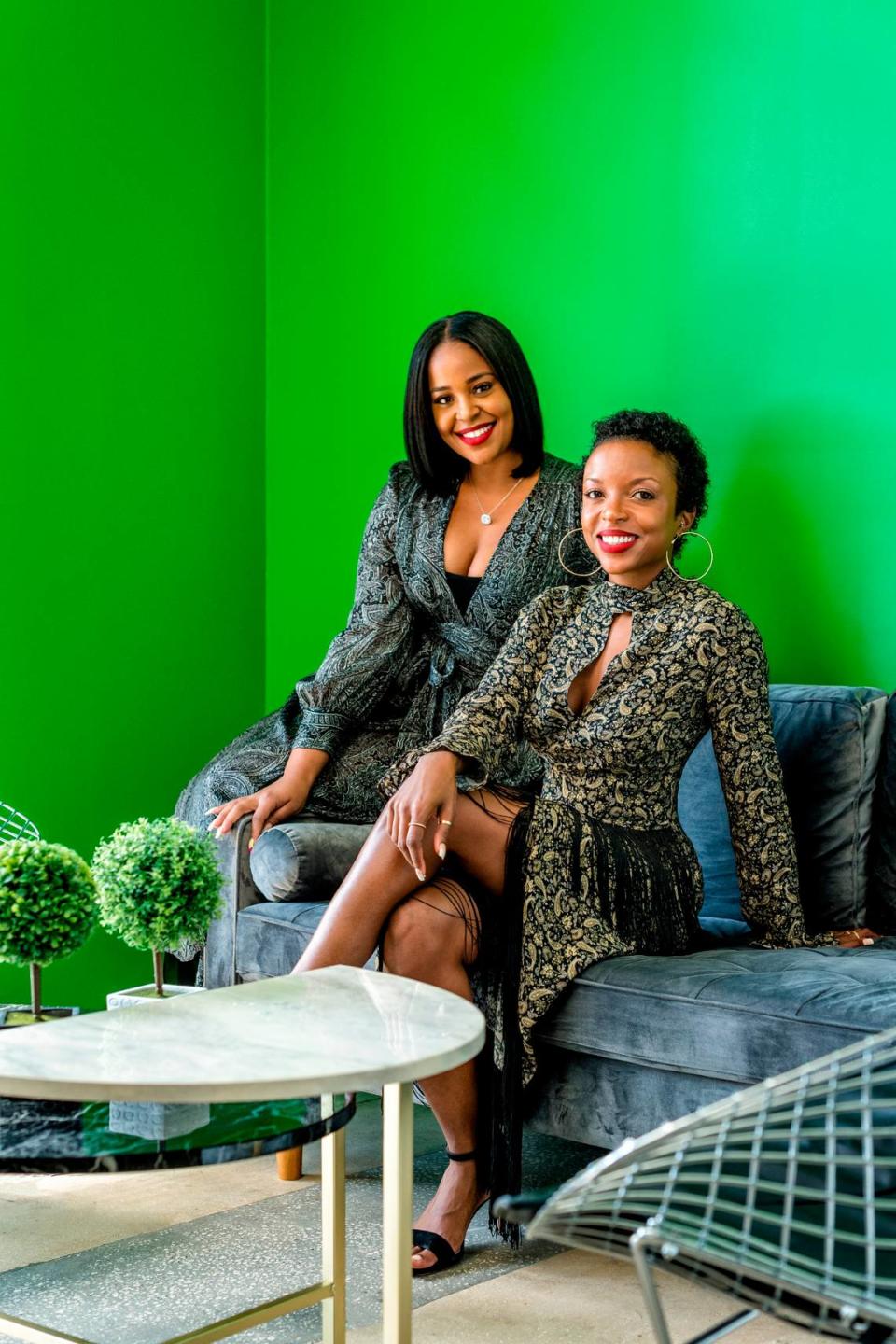These rising local power players are advancing the community through activism, education, and more
When a person’s passions include changing the way things are done in their chosen industry and community, life’s work goes beyond philanthropy to innovation. You may not have known their names before, but these South Florida locals are powerhouse influencers who are revolutionizing our world in both big and small ways.
The Activist Historian
For Dr. Tameka Bradley Hobbs, it was an African American history course as an undergraduate at Florida A&M University in Tallahassee that changed the course of her life. “I was riveted,” says Hobbs, a native of Suwannee on Florida’s northern Gulf coast. “It filled in so many blanks and answered questions that I’d always had.” Growing up in post-segregation Florida, she remembers noticing the unevenness of resources in her Black community. She swiftly changed her major from business to history, igniting a passion that would guide her career as a historian, educator and activist.
This fall, as associate provost of Florida Memorial University, South Florida’s only historically Black university, Hobbs launched the Social Justice Institute, a solutions-focused think tank and research center examining racial disparities and injustice in Miami-Dade County and across Florida. It was founded, in part, as a direct response to the nation’s reckoning with its legacy of systemic racism after the murder of George Floyd at the hands of Minneapolis police in late spring—but it was also a vision years in the making.

A year after Hobbs joined the faculty of FMU in 2011, she was confronted with another historical flashpoint of racial violence when 17-year-old Trayvon Martin was killed by a neighborhood watchman in Sanford, Florida, sparking the Black Lives Matter movement. At the time, Hobbs was deep into the writing and research of what would become her 2016 award-winning book, Democracy Abroad, Lynching at Home: Racial Violence in Florida, centering around the oral histories of four 1940s Florida lynchings, including 15-year-old Willie James Howard, who was from her hometown and a contemporary of her grandfather’s. She juxtaposes these acts of local violence with the country’s growing global reputation as a bastion of democracy during the World War II era.
As the mother of two young boys, troubled by the sense of history repeating itself, Hobbs had an epiphany that would plant the seed for the Social Justice Institute: “Your scholarship, your writing and reading, is not enough.” She traveled to Sanford with 150 FMU students for a teachable moment in activism. When she later discovered that Martin’s mother Sybrina Fulton was an alumnus of FMU, they worked together to house the Trayvon Martin Foundation at the campus library in 2014.
“There’s more we can do here to solve these problems,” says Hobbs. “We can leverage the intellect of our faculty, galvanize our students and work with the community to create change.” The Social Justice Institute will focus its energies on eight key areas, including systemic racism, economic and environmental justice, and civic engagement. This fall, the campus welcomed activist and organizer Valencia Gunder as their first “advocate in residence.”
“We are Black Lives Matter University,” says Hobbs. “We had to respond by creating something with long-lasting impact.”
The Health Tech Visionary
For entrepreneur Alex Ness, the 2008 recession came as a serious reckoning for his wealth advisory group. “It was like a big bucket of ice cold water,” says Ness of the precipitous loss of assets many of his clients suffered. “It changed my perspective about business. I decided I no longer wanted to work in the energy of money, especially managing other people’s money.”
He used the crisis to regroup, turning to meditation to find himself and to his network to seek support. After a yearlong sabbatical in Bali with his family, Ness emerged with the idea to create his own fund One Eleven Group—named for a sacred number signaling new beginnings in the Hindu tradition—which would invest in purpose-driven companies dedicated to the social good.

A chance meeting in 2014 with a tech company in Singapore would be the catalyst to founding Welwaze Medical, headquartered in Miami. After years of development, their first product, Celbrea TMD, a breast health monitoring device and app, is set to go to market in October as an FDA 510(k) cleared device. “It’s by far the hardest thing I’ve done in my life,” says Ness, a Barcelona native who’s called Miami home for 20 years. “It’s been a journey of humility.”
The safe, noninvasive 15-minute test detects changes in breast temperature as a preventative and diagnostic tool in breast cancer screenings. With the launch of Celbrea TMD, Welwaze plans to continue to innovate in the women’s health space. “There’s a paradigm shift from treating disease to treating health,” says Ness. “We can leverage technology to gather data and personalize recommendations for you to live a healthy life.”
The Workspace Pioneers
February 2020 would seem like an inopportune time to launch a small business, but Maghan Morin and Jeanine Suah, founders of Thynk Global, a co-working and event space in Little River, persevered. Dedicated to empowering and connecting people of color, women and their allies, Thynk Global offers a variety of memberships (including remote and virtual) at an accessible price point, starting at $87 for use of the shared space. The global coronavirus pandemic would force them to close their doors for two months just after opening them.
“We quickly pivoted,” said Morin. “We reached out to our members to ask them what they needed.” During the mandatory closure, they promoted their members in the retail space with an online pop-up shop. Thynk has since welcomed their 40 members back with a new set of safety protocols, including temperature checks, frequent cleaning and social distancing markers, and members are required to wear masks. “People are ready to get back to in person connections,” says Morin.

She and Suah, both Florida natives who met while working at a co-working space in St. Petersburg, were intentional about opening their space in Little River, a neighborhood historically home to Miami’s Haitian and Caribbean diaspora—and the next frontier, after Wynwood and the Design District, for developers. “Gentrification is not necessarily a bad thing,” says Morin. “It’s only a problem when developers don’t understand the community they’re entering.”
To that end, they’ve created a relationship with Metro 1, one of the neighborhood’s major developers and commercial real estate brokerages, who rent office space at Thynk. “I want to walk down the block and see a Black-owned business, a Latino-owned business, an Asian-owned business that came from Thynk,” says Morin of her vision for the neighborhood. “Our being here will allow for that to happen.”
“It all goes back to understanding our why,” adds Morin. This mission driven way of thinking is the reason Thynk is spelled with a “y.” Both Morin and Suah have distilled their “why” into a succinct and pragmatic mission: to help Black and brown people, and women, build generational wealth.
“Economic disparities have historically given Black people a disadvantage,” says Suah. “And Black women are doubly disadvantaged. When you create wealth by investing in real estate or building a small business, you can pass that down to the next generation. You own something that’s not controlled by other people. That’s a beautiful thing and I’m here for it.”
The Entrepreneurial Philanthropist
Entrepreneur Joseph Deitch was enamored with prizes. From the Nobel Prize to the National Book Award, he was drawn to the sizzle of the spotlight that these awards and their recipients would garner every year. “Prizes are sexier,” says Deitch, who’s lived in Miami for nearly a decade. “They attract more attention than a grant does.” That guiding principal informed the structure of the Elevate Prize Foundation, which Deitch launched in 2019 and will award $5 million to an inaugural cohort of ten finalists in October.
Recognizing social entrepreneurs, innovators, activists and problem solvers across every sector and industry, from healthcare to the environment, education, poverty, inequality, racial justice and the arts, Deitch’s ambitious vision for the annual Elevate Prize is to “elevate humanity on a global scale.” Ten finalists will be awarded a minimum prize of $300,000 and a two-year incubator program with access to a world-class network of mentors and advisors aimed to amplify their work and their causes. They’ve partnered with MIT Solve’s Global Challenge on Health Security and Pandemics to award at least one finalist committed to help solve the COVID-19 crisis.
Deitch, the founder and chairman of Commonwealth Financial Network, which as $200 billion in assets under management, tapped into his deep network to spread the word about the inaugural prize and recruit a star-studded panel of judges, including chef and activist José Andrés, retired Disney World executive Lee Cockrell and cellist Yo-Yo Ma. The prize attracted more than 1,300 applicants from around the world with 500 nominations from such luminaries as Al Gore, Julianne Moore and Harvard psychology professor and award-winning author, Steven Pinker.
Of his “issue agnostic” Elevate Prize Foundation, Deitch says, “Our north star, our mission, is to awaken the hero in all of us.”


